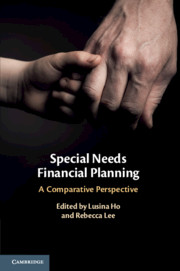Book contents
- Special Needs Financial Planning
- Special Needs Financial Planning
- Copyright page
- Contents
- Figures
- Tables
- Contributors
- Preface
- Table of Cases
- Table of Legislation
- Part I Adult Guardianship
- Part II Lasting/Enduring Power of Attorney
- Part III Special Needs Trust
- 9 What Will Happen When I’m Gone?
- 10 The Wispact Trusts: Making a Difference in a Means-Tested Support System
- 11 SNTC’s Operational Experience as Singapore’s First Non-Profit Trust Company
- 12 A New Perspective on Adult Guardianship and Trusts in Korea
- 13 Reforming Enduring Powers and Launching a Special Needs Trust in Hong Kong
- Index
10 - The Wispact Trusts: Making a Difference in a Means-Tested Support System
from Part III - Special Needs Trust
Published online by Cambridge University Press: 28 June 2019
- Special Needs Financial Planning
- Special Needs Financial Planning
- Copyright page
- Contents
- Figures
- Tables
- Contributors
- Preface
- Table of Cases
- Table of Legislation
- Part I Adult Guardianship
- Part II Lasting/Enduring Power of Attorney
- Part III Special Needs Trust
- 9 What Will Happen When I’m Gone?
- 10 The Wispact Trusts: Making a Difference in a Means-Tested Support System
- 11 SNTC’s Operational Experience as Singapore’s First Non-Profit Trust Company
- 12 A New Perspective on Adult Guardianship and Trusts in Korea
- 13 Reforming Enduring Powers and Launching a Special Needs Trust in Hong Kong
- Index
Summary
Section I of this chapter provides basic background on Wisconsin’s versions of the major national public benefit programmes that, in large part, dictate the structure and function of the Wispact trusts, the form of distributions, and the level of control that can be given to beneficiaries. Section II provides basic information on the two Wispact trusts, and the division of responsibility between the entities that manage the trusts. Sectiont III provides a picture of the role played by US-SNTs in general, and the particular roles envisioned for the Wispact trusts by the people who worked to create them. Sections IV and V describe eligibility to be a Wispact beneficiary and the process for creation and funding of an individual account. Section VI describes Wispact’s distribution policies, respect for the voice of the beneficiary and methods for working within SSI and Medicaid income-counting rules. Section VII addresses Wispact’s efforts to make smaller accounts affordable, and the uses of Wispact’s charitable Retained Fund. Section VIII is a brief discussion of US income tax issues and expenses faced by Wispact accounts. Section IX contains comments of the author on the relevance of Wispact’s experience to a basic-support trust like the one being envisioned for Hong Kong, and on how Wispact does, or does not, promote the human rights of its beneficiaries.
- Type
- Chapter
- Information
- Special Needs Financial PlanningA Comparative Perspective, pp. 268 - 302Publisher: Cambridge University PressPrint publication year: 2019



